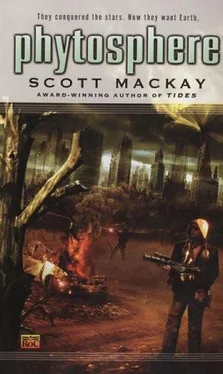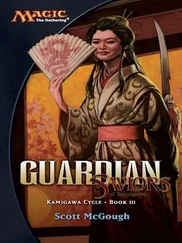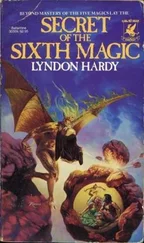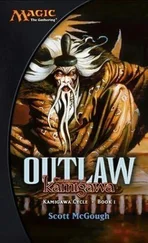Why don’t you do the sensible thing and give it all up?”
She left the living room, went into the den, placed the flashlight on the high window ledge, turned it on, and shone it out at the front lawn. She left it there, beaming out into the dark, then retraced her steps through the dining room, then the kitchen, grabbed her second flashlight, moved quickly through the dining and living rooms to the other side of the house, and went into Jake’s room.
She put the second flashlight on the window ledge and shone it out at the front lawn as well. Its beam intersected with the one coming from the den. She paused to measure the effect. A pale glow now lit the yard. Fulton would be a fool to come in from the front. Which meant he was going to come from the back. At least she didn’t have to fight this war on two fronts. Not unless they shot out the flashlights, and she didn’t think any of them were good enough marksmen for that.
She left Jake’s room, feeling her way through the dark house until she got to the kitchen, carrying her rifle loosely in her right hand. She grabbed her extra purse from the top of the refrigerator, the one she kept all her rounds in now. She slung it over her shoulder and exited by the back door.
In the light of the Moon, she saw a ground-clinging mist creep over the lawn. She scanned the backyard.
Her eyes strayed to the woods, and as the Moon clawed its way further out from behind the shroud, the poor dead things that used to be trees glowed as if from nuclear waste; not silver, not orange, but somewhere in between.
She leaned her rifle against the house. She heard Fulton’s megaphoned voice from out front, like a nasal and electronic ghost moaning out of the darkness, his words now unintelligible because the house blocked the way. How long before he gave up trying to convince her?
She hurried to the fence that ran between her lot and Leigh’s.
She got a ladder from the fence and carried it quietly to the back of the house. Made of Duratex, the ladder was light and easy to carry. She placed it against the mudroom, climbed to the top, put her rifle on the mud-room roof, dragged the ladder up, then leaned it against the side of the house so that it reached the top. Making sure the feet of the ladder straddled the mudroom peak securely, she climbed to the main roof.
She maneuvered around the low-pitched slopes with relative ease. She took up a position behind the satellite dish, and scanned the backyard. She had great lines of fire.
She got to her feet and moved to the front of the house.
The Moon was brighter now and she saw Buzz Fulton’s truck parked at the top of the east hill, and two police cruisers further down.
She waited.
After several minutes she saw men crossing the highway to the east and disappearing into the yard of the house beyond Leigh’s. Fear momentarily weakened her because up until now she had been hoping that they might never make a try for her food. She maneuvered back to her spot by the satellite dish and waited.
After about fifteen minutes, she saw two men at the back. They inspected the ground. Checking for buried food maybe? Then they came along the fence, crouched over. One of them was Maynard, the other Brennan. She had half a mind to let them break into the house and have their look around. When they found it empty, they might go home and never bother her again.
But then she decided it was best to end it once and for all.
“Maynard,” she called, “I’d stop exactly where you are. One step further and you’re going to have a bullet through your head.”
The two men stopped.
“You’re up on the roof?” called Fulton.
“Where’s your brother?” she called. “Are there other men?”
“Glenda, why don’t you come down from there and talk to us? We might as well try to be reasonable.”
“Why don’t you get off my property? You’re trespassing.”
“You know what we come for, Glenda,” called Brennan. “We know you been hoarding. Just give us your food, and we’ll be on our way. No one will get hurt.”
“I don’t think so, Brennan.”
“Why don’t you come down to the detachment office and join us?” said Fulton. “We’ve made quite a little place down there. I could protect you.”
“For what price, Maynard?”
“Glenda… Glenda, I’m going to give you to the count of three to come down. I don’t want to hurt you, and I don’t want to hurt your kids. But I got to do what I got do. We’re talking survival here, Glenda.
You know how it is. Don’t say I didn’t give you fair warning. One…”
And suddenly it made complete sense to her, in the way anything can possibly make sense after such a long time in the dark.
“Two…”
Fulton was the enemy. The county’s principal purveyor of death.
“Three…”
Yes, he was the heart and brains of the whole operation, and it was monstrous that he should have the county’s women under his “protection,” and it was up to her to stop all that…. Now careful, Glenda, are you thinking straight? Have you taken all things into consideration? You’re about to shoot a cop, and not just any cop. And yet…shoot him, and you shoot the whole works. Get rid of the head, and the body dies. Yes, it made perfect sense to her, in a fear-crazed way.
“Glenda, you leave us no choice but to—”
And before he could say another word she targeted the sheriff’s head—and it all came back to her, those weekends on the Smoky Hill River with her father, when the sun went down and the sky turned orange, and the partridges leaped into the sky. She took a bead on the sheriff’s head with automatic reflexes and hands as steady as iron, and caressed the trigger so that the rifle fired by itself, adding her own bit of Armageddon to the Apocalypse, the shot rocketing through the air with a roar that echoed in the hills, the bullet hitting its mark as if foreordained.
She heard the sheriff grunt, and he went down like a cow in a slaughterhouse, just so much meat thumping against the poor, dead grass.
Brennan did an odd little jump, his legs splaying, his arms jerking, like he was on thin ice and had just heard a crack. Then he ran toward the back, and she had the oddest sensation that she was floating, because she suddenly felt invincible—but so worried, so terrified for her children, because Brennan was running toward the woods where they were hiding.
So she shot Brennan too, and she must have got him in the spine because his legs gave out from under him, and his handgun flew off toward the shed, a speck of darkness in the gathering moonlight. He dragged himself along with his hands, grunting and groaning, until she lost sight of him in the woods.
Gerry knew Kafis from Marblehill, but every time he saw the alien—and Kafis was here on the Moon with a contingent of five other aliens—he had to get used to the Tarsalan’s appearance all over again, especially the bicephalic nature of his cranium. Under the alien’s coarse, dark hair the impression of two separate casings was disconcertingly unmistakable.
Kafis’s face was blue, the color of a robin’s egg. The quality of his skin was like the quality of human flesh, with all the imperfections of pores, wrinkles, and blemishes.
His eyes were a little over twice human size, and were divided into sclera, iris, and pupil, like human eyes. His irises were amber, like Stephanie’s were today, the color of a fine scotch whiskey, and his pupils, black like human pupils, were highly reactive, but not necessarily to light. The way the alien’s pupils dilated and contracted reminded Gerry of the way a hummingbird dances around a bloom, in sudden shifts, so that when Malcolm Hulke burped after a particularly capacious gulp of synthi-beer, Kafis’s pupils twitched open, then twitched closed, then twitched to the halfway point, the changes in aperture occurring with lightning quickness.
Читать дальше












